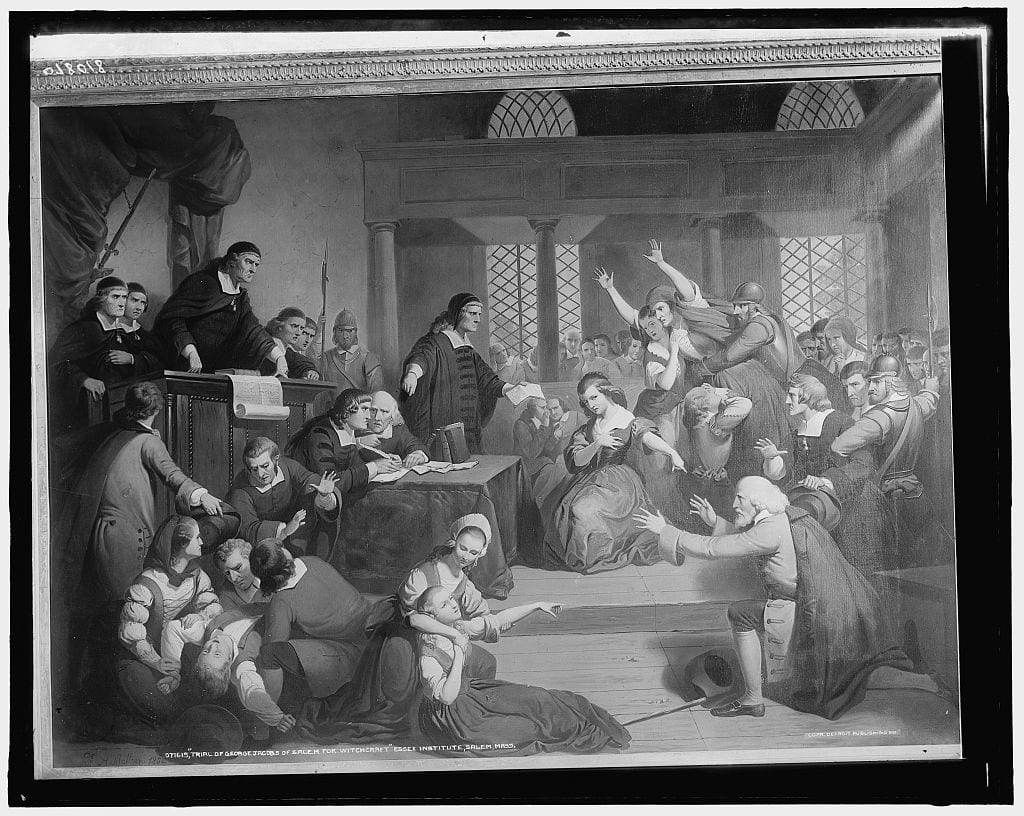Before Europeans established colonies in America, magical practices and traditions were an essential part of European life. People who practiced magic, often referred to as “cunning folk” or “wise folk,” were respected and valued by their communities. They were experts in the arts of healing and divining and were often the first people their neighbors would turn to in times of hardship. Magic was so much a part of daily life that people would practice it in their own homes, especially given that many magical rituals did not require any training. Magic was used to heal the sick, protect people and their families from harm intended towards them by others with whom they had disagreements; protect their livestock and economic stability from natural and deliberate causes; and to ease daily difficulties such as aiding in finding lost belongings.
Tag: Colonial Period
This image of the title page is from one of the surviving 1682 editions of A True History of the Captivity and Restoration of Mrs. Mary Rowlandson. Mrs. Rowlandson was taken captive during a raid on Lancaster, Massachusetts during King Philip’s War; a war initiated by Metacom (Philip was his english name), sachem of the Wampanoag tribe, over strained relationships with New English settlers and encroachments on their lands and sovereignty. Other regional tribes joined as allies of Metacom or independently as enemies of the New English settlers. Mrs. Rowlandson and about twenty other survivors, mostly women and young children, were taken in what Native cultures called a Mourning War, in which captives were taken from neighboring or hostile people and gradually incorporated into the captors tribal unit to replace loved ones and replenish the population. The bloody nature of the Lancaster raid can be attributed to deep seated hostilities between the Invasive and Native populations. Many English captives were returned; those that were not had been assimilated or died. Most Native captives were not so lucky. Most were killed before they could be taken, others fled to neighboring tribes; those that were not dead and could not flee were sold into regional or foreign slavery, usually to the Caribbean sugar islands. Christian Indians, Native people who had adopted Protestantism and the English language, were usually exiled to Praying towns or reservations.
Colonists used the belief of witchcraft to grapple with psychological tensions and concerns that had developed out of trying to make sense of their new external worlds, ultimately embedding witchcraft into the cultural belief system of the United States. In England, the Church suppressed any voice or power women may have had by limiting their societal roles. On the other hand, the Puritans believed that men and women were “equal” in the eyes of God. When arriving to the new settlements, Colonists needed to rely on both men and women to do their designated roles faithfully. This was to ensure the success and stability of their communities. Accusations of women practicing witchcraft in New England came about because the strict moral doctrine that Puritans adhered to created gendered societal roles and fear concerning the inability to attain salvation.
In the third installment of this series we will be looking at two examples of colonists challenging established relationships of authority and the deferential society of the early colonial period through the New Jersey Land Riots and Leisler’s Rebellion. Before we talk about the specific challenges to authority it is important to understand what it was to have public power in the early colonial period. As I have come to understand it, power and authority were generally acknowledged by an unspoken social contract. Early colonial society was very deferential. Authority was given to those of a higher social standing with the accompanying wealth and connections because it was believed that those who had no material wants were more detached from their own needs and could thus concern themselves with the interests of the commonweal. If a public figure was not acting in the interests of the public good then the people had the prerogative to express their dissatisfaction and remind the offending figure of the duty their privilege conveyed.
Today we will be looking at some forms of protest and dissent which colonial merchants and consumers engaged in, as well as some interesting incidents that followed. After the French and Indian War, or the Seven Years War as it was known globally, the British Parliament passed a series of acts imposing taxes and importation duties on food and material goods in an effort to pay for the war and future defense of the colonies. Years of inconsistent, unenforceable, and incomprehensible policies established a loose, laissez faire style of colonial governance that was very favorable to the colonies. Many in the economic, merchant, and supply occupations prospered and contributed, through their trades, to the relatively higher quality of life and opportunities in the colonies as a whole. As a result, a majority of the colonists were resentful of the efforts of such men as the British Chancellor of the Exchequer Charles Townshend to reassert imperial control over the economy and governance of the colonies. So, how did colonists voice their discontent with imperial policy? Let’s get into it.
Immediately following the murder of Mr. George Floyd Americans took to the streets to voice their support, sorrow, frustration, anger, and disappointment in a manner and magnitude that people of my generation have not seen, and America has not seen, since the Civil Rights era. In the midst of a global pandemic no less! Current events have me thinking back to our early beginnings as a collection of provincial colonies clustered along the North American coast. The First Amendment protects our most valuable rights: religion, speech, and the ability to protect these rights through peaceful assembly and petition.
© 2024 Crisis and Catharsis
Theme by Anders Noren — Up ↑



